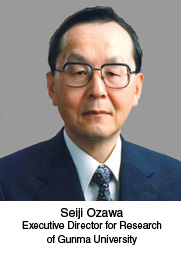Significance of collaboration of Gunma and Akita Universities to establish the COE for research and education on the biological regulatory system

After rigorous screening, the collaborative research and education program of Gunma and Akita Universities entitled “Signal transduction in the regulatory system and its disorders” was adopted in the life science section of the Global COE program. In the first half of 2007, private-sector members of the Council on Economic and Fiscal Policy proposed “tightening of selection and concentration for investments in the higher education”, “separation of research-focused and education-focused universities” and “culling of local universities”, which caused fierce discussions throughout the country. At that time, our universities, which are representative local universities, were broadly recognized as the ones that have the capability of forming the foothold for world-class research and education. This probably encouraged and motivated a lot of college personnel who are making efforts day and night for promoting their unique research and training researchers in local areas.
Gunma University has produced many achievements through the research into endocrinology and neuroscience. In endocrinological research, “Laboratory of Endocrinology” was established in Faculty of Medicine in 1951, which was upgraded to “Gunma University Endocrinological Research Institute” in 1963. It was reorganized into the present “Institute for Molecular and Cellular Regulation” in 1994. These institutes have been playing pivotal roles in the field of metabolism and endocrinology. In neuroscience research, “Behavioral Research Institute” was established in Faculty of Medicine in 1965, promoting pioneering research on the neural basis of human and animal behaviors. When Gunma University Graduate School of Medicine was reorganized in 2003, the researchers of this institute were incorporated to a neuroscience team in Faculty of Medicine, forming one of the largest neuroscience groups in Japan. In 2002-2006, Gunma University carried out the 21st century COE program entitled “Processing of biosignals; receptor activation, signal transduction, functional expression and animal behaviors” with the aim of the concurrent advance of endocrinology and neuroscience. It clarified the functional significances of a variety of novel molecules as well as mechanisms for complicated physiological events such as secretion of neurotransmitters and hormones. The results were published in reputable international journals and were highly evaluated.
On the other hand, Akita University with young excellent researchers has produced brilliant research achievements in the field of immunology and cancer biology. In 2002-2006, it also carried out the 21st century COE program entitled “Control of the cell fate”. It published epoch-making research results on the control of the immune function and cell proliferation by lipid signals one after another. When we, Gunma University’s researchers who engage in the neuroscience and endocrine research, saw the 21st century COE program activities of Akita University, we thought that there must be shared control mechanisms in the three biological regulatory systems —the nervous, endocrine and immune systems— as well as the cell proliferation control. It is considered that common mechanisms function in the signal reception and transduction for the ligand-receptor complex, the production of ion signals and lipid mediators, the control of phosphorylation cascade and the activation of transcription factors, and that these mechanisms make mutual cross-talk frequently among these regulatory systems.
In this Global COE program, we aim to further extend the research into the biological regulatory system in an interdisciplinary manner by coalescing the strength of Gunma and Akita Universities. Such comprehensive approach is considered to be the most effective for elucidating the pathogenesis of many intractable diseases and making treatment strategies. Even in the international view point, our research group aiming to form the foothold for the comprehensive study on the nervous, endocrine, and immune systems is very unique. It is expected to create new concepts regarding the biological regulatory system in the incoming 5 years. In addition, we think that it is important to train competent researchers of the next generation in the research and education center with the above mentioned broad perspective. We would appreciate your advice and assistance.